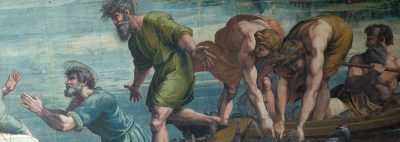I’ve always found Paul’s use of Hosea 1:10 in Romans 9 fascinating. In Hosea 1, God commands the prophet Hosea to marry a whore named Gomer. Their marriage symbolises Israel’s spiritual adultery, which was expressed through rampant idolatry. This Israel primarily refers to the ten tribes of the northern kingdom, which we tend to overlook today.
Hosea and Gomer have three children, each given a prophetic name: Jezreel (signifying judgment on Israel’s ruling dynasty), Lo-Ruhamah (“Not My People,” signalling God’s withdrawal of compassionate care), and Lo-Ammi (“Not My People,” marking the breaking of the covenant).
These names served as an announcement of impending judgment upon Israel, where the northern kingdom would be exiled from the land. As God foretold in Amos 9:9, “Behold, I will command, and shake the house of Israel among all the nations as one shakes with a sieve, but no pebble shall fall to the earth.” Indeed, Jezreel’s name also means “God will scatter and sow.”
Yet, despite this judgment, Hosea’s story concludes with hope. Even though Israel had been unfaithful, God promises to eventually regather His people, reunite Israel with Christian Judah (the southern kingdom), renew the covenant, and once again call them His children.
In Romans, Paul draws from Hosea 1:10 and 2:23, asserting that the salvation offered through Jesus Christ, both to Jews and Gentiles, is the fulfilment of Hosea’s prophecy of restoration. Paul uses Hosea’s words, ‘I will call them my people, which were not my people,’ to demonstrate that the restoration Hosea spoke of is now being fulfilled in the new people of God, comprising both Jews and Gentiles, including the church in Rome. Those who were once alienated—whether Gentile or Jew—are now called “children of the living God.”
It is as though the judgment on the northern kingdom turned into a blessing for all peoples. Israel’s expulsion into the nations is like a fishing net cast across the world. This is similar to Jesus’ parable in Matthew 13:47, where He describes the kingdom of heaven as a net thrown into the sea (symbolic of the nations), collecting fish of every kind.
The Great Commission is the process of regathering these scattered peoples to God. Jesus further illustrates this mission when He says, “I have other sheep that are not of this fold; I must bring them also, and they will listen to my voice. So there will be one flock, one shepherd” (John 10:16).
This is the ultimate fulfilment of the Abrahamic promise—that through Abraham’s seed, Jesus, all nations would be blessed. It is the mission to “gather into one the children of God who are scattered abroad” (John 11:52), and not just them, but all nations would be brought in with them.
As Isaiah 49:6 testifies: God says to Jesus, “It is too light a thing that you should be My Servant to raise up the tribes of Jacob and to bring back the preserved of Israel; I will make you as a light to the nations, that my salvation may reach to the end of the earth.”
In this way, Paul’s use of Hosea not only reveals God’s enduring faithfulness to His covenant people but also highlights the expansive, redemptive plan in Christ that unites both Israel and the nations into one reconciled family under God’s saving grace.
Click this link for the original source of this article.
Author: Ben Davis
This content is courtesy of, and owned and copyrighted by, https://caldronpool.com and its author. This content is made available by use of the public RSS feed offered by the host site and is used for educational purposes only. If you are the author or represent the host site and would like this content removed now and in the future, please contact USSANews.com using the email address in the Contact page found in the website menu.








